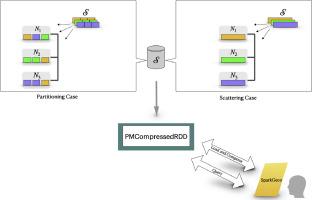分布式压缩基因组学:基于spark的基本模式匹配原语
IF 6.2
2区 计算机科学
Q1 COMPUTER SCIENCE, THEORY & METHODS
Future Generation Computer Systems-The International Journal of Escience
Pub Date : 2025-09-29
DOI:10.1016/j.future.2025.108169
引用次数: 0
摘要
压缩基因组学利用压缩数据表示来提高序列比较和搜索等生物信息学任务的效率。令人惊讶的是,在基因组分析领域中,对大型DNA序列集合进行模式匹配的基本操作仍未被探索。然而,像Spark这样的分布式系统提供了有效处理日益庞大的基因组数据集所必需的可扩展性。我们提出了FM-Index和压缩Boyer-Moore (CBM)算法的第一个基于spark的实现,评估了它们的性能,并提供了它们在大规模生物信息学应用中的优势。一项全面的实验研究表明,与未压缩的方法相比,性能有明显的提高。此外,我们还介绍了SparkGeco,这是一个分布式压缩基因组软件库,旨在简化将FM-Index和CBM算法集成到Apache Spark中的DNA序列分析管道中,从而支持高效和可扩展的基因组分析工作流程的开发。这项工作为计算生物学中高性能、以数据为中心的eScience解决方案迈出了具体的一步。本文章由计算机程序翻译,如有差异,请以英文原文为准。

Distributed compressive genomics: Fundamental pattern matching primitives via spark
Compressive genomics leverages compressed data representations to enhance the efficiency of bioinformatics tasks like sequence comparison and search. Surprisingly, the fundamental operation of pattern matching on large DNA sequence collections remains unexplored in the realm of genomic analysis. However, distributed systems like Spark offer the scalability necessary to process increasingly large genomic datasets efficiently. We present the first Spark-based implementation of the FM-Index and Compressed Boyer-Moore (CBM) algorithms, evaluating their performance and providing insights into their advantages for large-scale bioinformatics applications. A comprehensive experimental study demonstrates clear performance gains over uncompressed approaches. Furthermore, we introduce SparkGeco, a distributed compressive genomics software library designed to simplify the integration of FM-Index and CBM algorithms into DNA sequence analysis pipelines within Apache Spark, thus supporting the development of efficient and scalable genomic analysis workflows. This work provides a concrete step towards high-performance, data-centric eScience solutions in computational biology.
求助全文
通过发布文献求助,成功后即可免费获取论文全文。
去求助
来源期刊
CiteScore
19.90
自引率
2.70%
发文量
376
审稿时长
10.6 months
期刊介绍:
Computing infrastructures and systems are constantly evolving, resulting in increasingly complex and collaborative scientific applications. To cope with these advancements, there is a growing need for collaborative tools that can effectively map, control, and execute these applications.
Furthermore, with the explosion of Big Data, there is a requirement for innovative methods and infrastructures to collect, analyze, and derive meaningful insights from the vast amount of data generated. This necessitates the integration of computational and storage capabilities, databases, sensors, and human collaboration.
Future Generation Computer Systems aims to pioneer advancements in distributed systems, collaborative environments, high-performance computing, and Big Data analytics. It strives to stay at the forefront of developments in grids, clouds, and the Internet of Things (IoT) to effectively address the challenges posed by these wide-area, fully distributed sensing and computing systems.

 求助内容:
求助内容: 应助结果提醒方式:
应助结果提醒方式:


